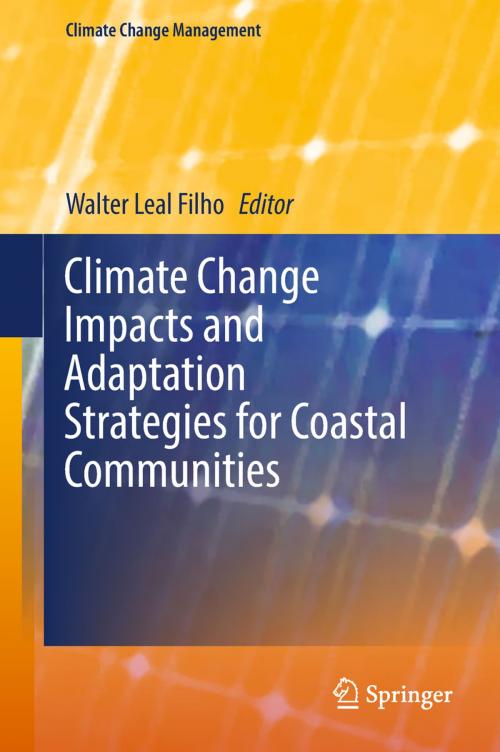Climate Change Impacts and Adaptation Strategies for Coastal Communities
Nonfiction, Science & Nature, Science, Biological Sciences, Environmental Science, Earth Sciences, Nature| Author: | ISBN: | 9783319707037 | |
| Publisher: | Springer International Publishing | Publication: | November 23, 2017 |
| Imprint: | Springer | Language: | English |
| Author: | |
| ISBN: | 9783319707037 |
| Publisher: | Springer International Publishing |
| Publication: | November 23, 2017 |
| Imprint: | Springer |
| Language: | English |
This book presents a comprehensive overview of research and projects regarding climate change adaptation in coastal areas, providing government and nongovernment bodies with a sound basis to promote climate change adaptation efforts.According to the 5th Assessment Report by the Intergovernmental Panel on Climate Change (IPCC), coastal zones are highly vulnerable to climate change, and climate-driven impacts may be further exacerbated by other human-induced pressures.
Apart from sea-level rise, which poses a threat to both human well-being and property, extreme events such as cyclones and storm surges lead not only to significant damage to property and infrastructure, but also to salt water intrusion, groundwater salinisation, and intensified soil erosion, among many other problems. There are also numerous negative impacts on the natural environment and biodiversity, including damage to important wetlands and habitats that safeguard the overall ecological balance, and consequently the provision of ecosystem services and goods on which the livelihoods of millions of people depend. As such, there is a need for a better understanding of how climate change affects coastal areas and communities, and for the identification of processes, methods and tools that can help the countries and communities in coastal areas to adapt and become more resilient.
It is against this background that this book has been produced. It includes papers written by scholars, social movements, practitioners and members of governmental agencies, pursuing research and/or executing climate change projects in coastal areas and working with coastal communities. Focusing on “managing climate change in coastal regions”, it showcases valuable lessons learned from research and field projects and presents best practices to foster climate change adaptation in coastal areas and communities, which can be implemented elsewhere.
This book presents a comprehensive overview of research and projects regarding climate change adaptation in coastal areas, providing government and nongovernment bodies with a sound basis to promote climate change adaptation efforts.According to the 5th Assessment Report by the Intergovernmental Panel on Climate Change (IPCC), coastal zones are highly vulnerable to climate change, and climate-driven impacts may be further exacerbated by other human-induced pressures.
Apart from sea-level rise, which poses a threat to both human well-being and property, extreme events such as cyclones and storm surges lead not only to significant damage to property and infrastructure, but also to salt water intrusion, groundwater salinisation, and intensified soil erosion, among many other problems. There are also numerous negative impacts on the natural environment and biodiversity, including damage to important wetlands and habitats that safeguard the overall ecological balance, and consequently the provision of ecosystem services and goods on which the livelihoods of millions of people depend. As such, there is a need for a better understanding of how climate change affects coastal areas and communities, and for the identification of processes, methods and tools that can help the countries and communities in coastal areas to adapt and become more resilient.
It is against this background that this book has been produced. It includes papers written by scholars, social movements, practitioners and members of governmental agencies, pursuing research and/or executing climate change projects in coastal areas and working with coastal communities. Focusing on “managing climate change in coastal regions”, it showcases valuable lessons learned from research and field projects and presents best practices to foster climate change adaptation in coastal areas and communities, which can be implemented elsewhere.















